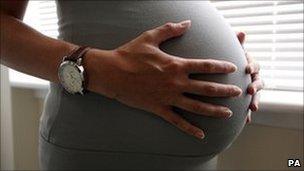Campaign to widen midwife recruitment in Wales
- Published

A new project aims to recruit more midwives from Communities First areas.
More midwives from diverse communities in Wales are needed to "mirror the local population", according to an expert.
Prof Sheila Hunt said some women ignore the career because they are "misinformed on such issues as the wearing of veils".
Of 1,560 midwives in Wales, only 0.4% are mixed race, black or black British, and 0.2% are Asian or Asian British.
A new campaign aims to recruit from economically deprived areas.
According to the latest statistics from the Welsh Government, the majority (72.2%) of midwives in Wales are white.
Prof Hunt, head of Cardiff University's school of nursing and midwifery studies, is launching the Nursing Careers for All project in September to "engage closely with a variety of community groups".
She also aims to help to improve access to higher education in deprived areas.
"Students from diverse communities are currently in the minority," she said.
National statistics
"This is often because they have not made the right choices at GCSE level or they think midwifery is not open to them."
But she stressed that the project was not specifically targeting members of ethnic minorities.
"We are focusing on Communities First areas where the proportion of people from those communities is likely to be higher," she said.
"We are not setting out to recruit Somali women to be midwives to Somali women."
The latest national statistics on population estimates by ethnic group released by the Office for National Statistics in May 2011, show that "between 2001 and 2009, the percentage of people in Wales from a minority ethnic groups increased from 2.1% to 4.1%".
'Respect beliefs'
The figures also show that, at a local authority level, Cardiff, Newport, the Vale of Glamorgan and Swansea had the highest proportions of people from minority ethnic groups in 2009.
In Wales, 28,100 people are mixed ethnicity, 48,900 are Asian or Asian British and 17,200 are black or black British.
Helen Rogers, director of the Royal College of Midwifery (RCM), said it was vital for midwives to understand the diversity of their local community.
"It's important to respect cultural beliefs and practices, no matter what they are," she said.
"There are lots of myths and misunderstandings. For example, health care in Poland is very different.
"A midwife has more of a handmaiden role in Poland, so when they give Polish women advice, they don't see it as professional advice.
"And in the Irish traveller community, when a woman has a baby the whole extended family descends to visit, which is difficult when there are visiting regulations of two visitors to a bed. We try to find a compromise."
But she added it was not essential to have a midwife from the same community.
"If you have a woman who is Welsh speaking, it doesn't mean she can't be looked after by a midwife who doesn't speak Welsh," she said.
- Published15 July 2011
- Published3 February 2011
- Published20 August 2010
- Published29 December 2010
- Published25 July 2011
- Published25 August 2010